A wave of frustration swept through the House as Representative Melanie Stansbury publicly questioned the concessions made by eight Senate Democrats that ultimately averted a prolonged government shutdown. As a leading voice on government efficiency, Stansbury viewed the inclusion of job protections for federal employees as a necessary, yet disheartening, safeguard.
Stansbury argued that Congress should never have reached a point where explicit protection against mass firings was required. She’s been a vocal opponent of the previous administration’s attempts to slash government spending through widespread dismissals, asserting these actions directly violated established employment laws.
The core of the disagreement centered on the legality of the administration’s tactics during the shutdown. Stansbury maintained that both the mass firings and the threat to withhold back pay were unlawful, highlighting a fundamental clash in interpretations of federal regulations.
The resolution, a short-term spending deal passed 60-40 in the Senate, funds the government through January 30th, covering appropriations for key areas like the legislative branch, agriculture, Veterans Affairs, and military construction. Crucially, it includes language specifically preventing future mass reductions in force and promises reinstatement with back pay for those already dismissed.
Senator Tim Kaine, one of the eight Democrats who helped overcome the filibuster threat, defended his vote, stating the protections for federal workers justified the ordeal. For Kaine, and for his state of Virginia – home to a significant federal workforce – the assurance against future “RIFs” was a paramount concern.
Kaine revealed he’d communicated his priorities to Senate leadership from the outset, emphasizing the importance of securing protections for federal employees. He saw a pathway to a positive outcome for those workers and prioritized that possibility throughout the negotiations.
However, Stansbury sharply disagreed with Kaine’s assessment, believing the fight for federal worker protections – and affordable healthcare – could have been waged without resorting to a shutdown. She argued the entire crisis was avoidable, stemming from a contentious bill passed earlier in the year.
Stansbury lamented that a critical Democratic demand – an extension of COVID-era healthcare subsidies – was completely ignored during the negotiations. Despite weeks of deadlock, millions of Americans now face the potential loss of health insurance or housing instability.
The resolution, while averting immediate crisis, left a lingering sense of dissatisfaction. The shutdown exposed deep divisions within the Democratic party, highlighting conflicting priorities and a fundamental disagreement over the tactics employed to achieve their goals.






